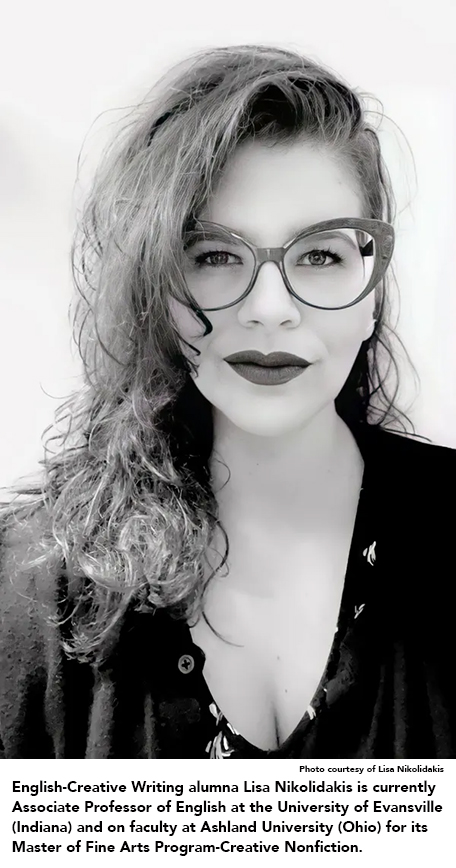English alumna Lisa Nikolidakis returns to Tallahassee for reading, conversation with Professor Diane Roberts at Midtown Reader
Florida State University English-Creative Writing alumna Lisa Nikolidakis returns to Tallahassee on Wednesday, Sept. 7, for an event at Midtown Reader that spotlights her new memoir, No One Crosses the Wolf. She visits the local bookstore for a reading and conversation with English Professor Diane Roberts.

The official release of the publication was Sept. 1, 2022, and an Aug. 23 post in Vanity Fair titled “14 New Books to Read in September” included Nikolidakis’ as one of the choices.
“I’m fizzy with gratitude,” she says about the back-to-back achievements. “That sounds absurd but feels true.”
The book’s publisher, Little A, calls No One Crosses the Wolf “a powerful memoir about the traumas of a perilous childhood, a shattering murder-suicide, and a healing journey from escape to survival to recovery.” Nikolidakis writes about the violent and abusive relationship she had with her father, which she processed through writing into her mid-20s.
On Nikolidakis’ 27th birthday, her father murdered his live-in girlfriend and her daughter and then killed himself. In No One Crosses the Wolf, she “explores not only the making of a killer but her own liberation from the demons that haunted her and her profound self-restoration in the face of unimaginable crimes,” according to Little A.
The idea that so many people, most of them complete strangers, will read her most innermost and personal thoughts is not daunting to Nikolidakis.
“There was a time when being seen terrified me,” she says. “After all, the cost of being seen in the house I grew up in—of telling family secrets—was actually death. In 2015, I had a short essay about the content of my memoir go viral across Hearst sites, and it really threw me—being seen at that level.”
The swirl of emotions caused her to stop writing the book for three years, and she spent the time working intensely in therapy.
“Now, I’m solid. What people think about the book is their business,” Nikolidakis says. “Don’t get me wrong—of course I hope folks like my work. But I feel like my job is over—the work of writing and rewriting the book.
“I can’t control what anyone thinks about it, but I am fine being seen because I know who I am.”
Since she earned her doctoral degree in 2011, Nikolidakis has received numerous accolades for her writing. Her work was included in the 2016 Best American Essays, edited by author Jonathan Franzen, and her prizes and awards include the Annie Dillard, the Orlando, and the Lamar York. In addition, she is Associate Professor of English at the University of Evansville in Indiana and on faculty at Ashland University in Ohio for its low-residency Master of Fine Arts Program.
Nikolidakis earned both her Bachelor of Arts and Master of Arts at Rutgers University in New Jersey, after growing up in a South Jersey suburb of Philadelphia. She studied for her doctorate at FSU from 2007 to 2011. Former FSU English Professor Julianna Baggott was the chair of her dissertation committee, and Roberts—Nikolidakis’ conversation partner at Midtown—was on her committee as well.
“The encouragement from them and [former FSU English Professor] Erin Belieu, who wasn’t even in my genre, kept me forever pointed at finishing this project,” Nikolidakis says.
 The setting for her memoir was established in her childhood, but she did not begin writing about those experiences until the day after her father’s murder-suicide: “I wrote because I didn’t know what else to do, how else to survive,” she says.
The setting for her memoir was established in her childhood, but she did not begin writing about those experiences until the day after her father’s murder-suicide: “I wrote because I didn’t know what else to do, how else to survive,” she says.
“When I first got to FSU, I was thrilled to arrive in a space in which no one knew me or my story,” she continues. “Then, in my first workshop, I wrote about him, so there went that idea. I’m not sure I could help it; for a long time, everything in my life was filtered through a lens of my father.”
Her advice to students and writers who want to delve into and write about topics such as those she explores is to prepare for the emotional turmoil.
“Have self-care habits in place before you begin,” Nikolidakis says. “I worked on this book for so long—17 years—and for at least the first half of those, ‘self-care’ wasn’t a term I was even aware of.
“Also, it might take longer than you want it to.”
Now that No One Crosses the Wolf is in the hands of the public, Nikolidakis will continue her normal routine of working on multiple projects at once. She has a short story collection completed, a novel in the works, and another nonfiction book that blends memoir and research about chronic illness.
Her author’s bio on her website has a sentence that reads “She also writes humor, mostly for survival.” Nikolidakis discovered the personal essay, in terms of form, during her undergraduate years at Rutgers, although that writing was “more cultural criticism meets humor,” she explains.
“Despite the sobriety of the trauma writing I do, in real life, I come at most things with humor,” Nikolidakis says. “I’ve long loved the Oscar Wilde quote, ‘Life is too important to be taken seriously.’”

